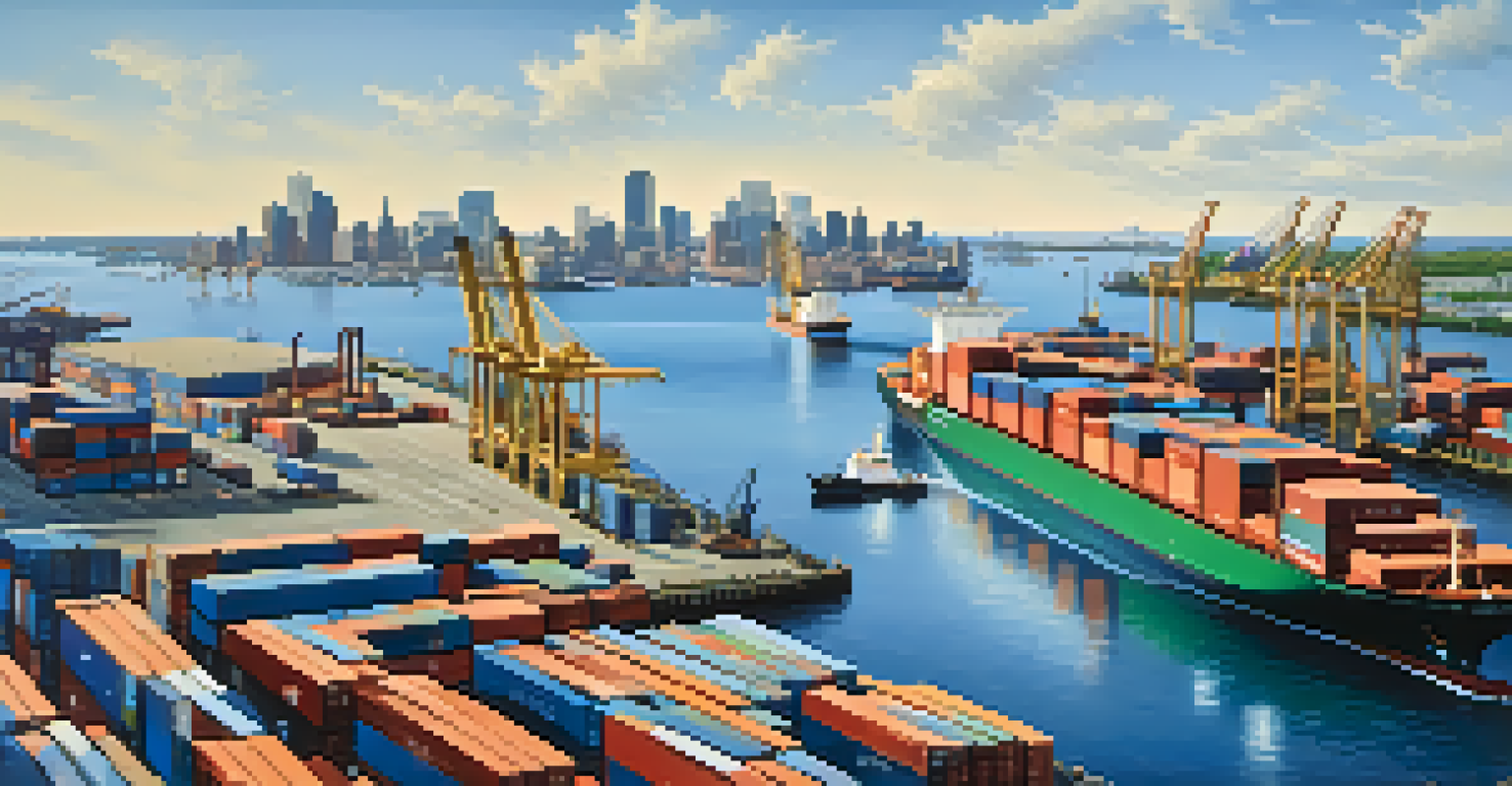Boston Harbor: Gateway for Industrial Resources

Historical Overview of Boston Harbor's Industrial Significance
Boston Harbor has been a crucial point of trade and industry since the early colonial days. Established as a shipping port in the 17th century, it quickly became a vital artery for goods flowing in and out of New England. Over the centuries, its strategic location has attracted various industries, shaping the economic landscape of the region.
Boston Harbor is a picturesque reminder of our nation's rich maritime history and its vital role in trade and industry.
During the Industrial Revolution, the harbor's role expanded significantly. Factories and shipyards sprang up along its shores, capitalizing on the deep waters that allowed for larger vessels. This period marked a transformation, as Boston Harbor became a focal point for manufacturing and shipping, connecting local industries to global markets.
Today, the legacy of Boston Harbor as an industrial gateway is still evident. While the nature of industry has evolved, the harbor continues to facilitate trade and commerce, serving as a reminder of its rich history. Its historical significance underscores the importance of maritime resources in shaping urban economies.
Key Industries Supported by Boston Harbor
The diverse industrial landscape of Boston Harbor has supported various sectors over the years. From shipbuilding and manufacturing to fishing and shipping, the harbor has been a lifeline for many local businesses. Each industry has contributed to the growth and development of the area, creating jobs and boosting the economy.

One of the standout industries is the maritime sector, which remains a cornerstone of Boston Harbor's economy. This includes everything from cargo shipping to cruise lines, showcasing the harbor's ability to adapt to changing economic conditions. The maritime industry not only drives commerce but also enhances tourism, bringing visitors to experience the rich history of the area.
Boston Harbor's Industrial Legacy
Since its establishment in the 17th century, Boston Harbor has been a vital hub for trade and industry, influencing the region's economic landscape.
Additionally, the harbor has seen a rise in tech and biotech industries in recent years. Companies are increasingly utilizing the waterfront for research and development, taking advantage of the area's historical significance while pushing forward into innovative sectors. This blend of tradition and modernization exemplifies the harbor's ongoing importance.
Impact of Transportation Infrastructure on Industrial Growth
The transportation infrastructure surrounding Boston Harbor has played a pivotal role in its industrial success. With well-connected roadways, rail lines, and ferry services, the harbor is easily accessible for both imports and exports. This connectivity has facilitated the seamless movement of goods, driving economic growth in the region.
The ocean is a central part of our economy, and the sustainability of our maritime activities is essential for future generations.
The harbor's deep-water channels allow for larger vessels, which can carry more cargo than smaller ships. This capability is crucial for industries that rely on shipping bulk goods, such as construction materials and consumer products. As a result, the harbor has become a preferred choice for businesses looking to maximize their shipping efficiency.
Moreover, the ongoing investments in transportation infrastructure continue to enhance the harbor's potential. Upgrades to port facilities and improvements in logistics are designed to meet the demands of modern commerce. This focus on infrastructure not only supports existing industries but also attracts new businesses to the area.
Environmental Considerations and Industrial Activity
As industrial activities have flourished at Boston Harbor, so too have concerns about environmental impacts. The balance between economic growth and ecological preservation is a challenge that has been increasingly recognized. Efforts to mitigate pollution and protect marine habitats are crucial for the sustainability of the harbor.
In response to these challenges, numerous initiatives have been implemented to promote cleaner industrial practices. These include regulations on waste management and the promotion of green technologies. Businesses are encouraged to adopt practices that minimize their environmental footprint, ensuring that the harbor can thrive for future generations.
Future of Sustainable Industries
Emerging technologies and sustainability initiatives are set to reshape Boston Harbor's industrial landscape, positioning it as a leader in renewable energy.
Community engagement plays a significant role in these efforts, as local residents advocate for a healthier environment. Collaborative projects between industries, government agencies, and environmental groups are fostering a more sustainable approach to industrial growth. This collective effort highlights the importance of environmental stewardship in maintaining the harbor's vitality.
Role of Boston Harbor in Global Trade Networks
Boston Harbor serves as a vital link in global trade networks, acting as a gateway for international commerce. Its location provides access to major shipping routes, making it an attractive destination for importers and exporters alike. This strategic positioning enhances the economic significance of the harbor on a global scale.
The harbor's ability to accommodate large cargo ships has made it a preferred port for many companies engaged in international trade. From electronics to textiles, a vast array of goods pass through its waters, showcasing the diversity of trade. This influx of products not only benefits local businesses but also contributes to the wider economy.
Furthermore, Boston Harbor's participation in global trade fosters relationships with other ports around the world. These connections can lead to collaborations and partnerships that enhance trade opportunities. As the global market continues to evolve, the harbor remains an essential player in facilitating international commerce.
Tourism and the Industrial Heritage of Boston Harbor
In addition to its industrial significance, Boston Harbor is a destination for tourism, drawing visitors eager to explore its rich heritage. The waterfront offers a blend of historical sites, museums, and recreational activities that celebrate the harbor's past. This tourism not only educates visitors but also supports local economies.
Tour boats and ferry services provide unique perspectives on the harbor's industrial landscape, allowing tourists to appreciate its significance from the water. Many attractions, such as the Boston Tea Party Ships and Museum, highlight key historical events tied to the harbor. These experiences help to preserve the stories of those who contributed to the harbor's legacy.
Tourism Celebrates Industrial Heritage
Boston Harbor not only serves industrial purposes but also attracts tourists, showcasing its rich history and supporting local economies.
Moreover, events such as harbor festivals and seafood fairs invite the community and visitors to celebrate the local culture. These gatherings emphasize the importance of the harbor as a historical and cultural hub, fostering a sense of pride among residents. The intertwining of tourism and industry showcases the multifaceted role of Boston Harbor.
Future Outlook for Boston Harbor's Industrial Landscape
As we look to the future, Boston Harbor's industrial landscape is poised for continued evolution. Emerging technologies and shifting market demands are shaping how industries operate within the harbor. This adaptability is essential for maintaining its relevance in an ever-changing economic environment.
Sustainability initiatives are likely to play a significant role in the harbor's future development. As industries strive to reduce their environmental impact, innovative practices will become increasingly important. This shift not only addresses ecological concerns but also attracts businesses that prioritize sustainability.

In addition, the potential for new industries, such as renewable energy, could redefine the harbor's role in the economy. As the push for cleaner energy sources grows, Boston Harbor may become a hub for wind and solar energy projects. This forward-thinking approach will ensure that the harbor remains an industrial gateway for years to come.